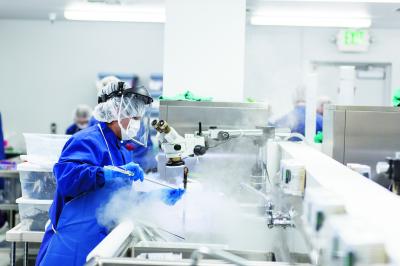Researchers find healthcare supply chains major sources of pollution and greenhouse gas emissions

Credit: Association of Medical Device Reprocessors
Regulated medical device reprocessing is an important tool in improving environmental and public health outcomes, according to a new analysis published in Health Affairs. The paper indicates that health care systems generate significant amounts of air pollution and greenhouse gas emissions, the vast majority of which come from the supply chain. Hospitals that have medical devices reprocessed by regulated reprocessors removed over 7,100 tons of waste, a number that could grow dramatically, according to the researchers.
“COVID-19 has shined a light on health care supply chain vulnerabilities and research like this outlines the path to a more resilient, cost-effective and less toxic health care system of the future,” said Dan Vukelich, Esq., President, Association of Medical Device Reprocessors. “A circular medical device industry, in the words of the study’s authors, established on ‘principles of resource conservation, efficiency, and cycles of reuse and material recovery’ will require safe, effective products and services provided by regulated reprocessors.”
The study, led by Andrea MacNeill, MD, Clinical Associate Professor, Department of Surgery at the University of British Columbia, traced these environmental issues to health care supply chains. Specifically, the authors noted an over-reliance on medical devices that are designed and labelled for “single-use,” used once, and then disposed of — even if many of these products can be reused safely. This cycle of singular use and then disposal, according to the researchers, constitutes what they refer to as a “linear economy.” The linear economy at hospitals is a primary source of waste, pollution and emissions in the health care system, as well as a cause of unnecessary financial costs and vulnerability to disruption or demand fluctuation.
Flipping the Switch from Linear to Circular Economies
To address these issues, the authors recommend that the linear economy be replaced with a “circular economy,” in which products are maintained in circulation for as long as possible before disposal. The authors identified improvements through which stakeholders in the health care system, such as hospitals, medical device manufacturers and regulators, could increase the circularity of the industry.
To drive the circular economy, improvements could include a full, life-cycle accounting of the environmental impact of medical devices and stricter procurement policies on the part of hospitals giving preference to reusable and sustainable products Further, reusable and reprocessable single-use devices should be preferred over single-use or other devices that are used once and discarded.
“Reprocessing” refers, among other steps, to the cleaning, inspection, testing, and repackaging of a medical device originally labelled for single-use so that it may be returned to service one or more times. Relying on AMDR data, the study noted that in 2018 alone, reprocessing companies in the United States, Canada, and Europe reduced hospital solid waste generation by almost 7,100 tons and generated cost savings of more than $470 million for healthcare institutions.
“I am personally quite proud to see allies of reuse and reprocessing, such as those from the prestigious universities that participated in this study, lauding the enormous environmental and public health benefits of reprocessing in Health Affairs,” said Mr. Vukelich.
###
About AMDR
The Association of Medical Device Reprocessors is the global trade association for the regulated, professional single-use device reprocessing and remanufacturing industry. For 20 years, AMDR has promoted remanufacturing as an important healthcare strategy that helps hospitals and healthcare providers increase quality, reduce costs, and strengthen the supply chain. AMDR protects the interests of its members in regulation, legislation and standard-setting.
AMDR members include Innovative Health, Medline Renewal, NEScientific, ReNu Medical, Stryker Sustainable Solution, Sustainable Technologies (a Cardinal Health Business), and Vanguard AG.
Having played a key role in the establishment of the reprocessing industry, AMDR continues to push the global medical technology industry and lead the way for remanufacturing to play a defining role in the evolution and use of new device technologies.
Media Contact
David Sheon
[email protected]




